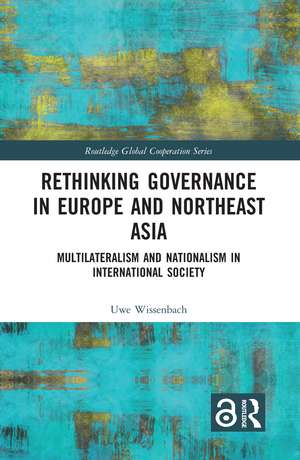Rethinking Governance in Europe and Northeast Asia: Multilateralism and Nationalism in International Society: Routledge Global Cooperation Series
Autor Uwe Wissenbachen Limba Engleză Paperback – 30 iun 2021
Both Europe and Northeast Asia can be seen as success stories of the late 20th/ early 21st centuries, but by having followed different approaches to international governance. The book traces these two trajectories through critical junctures in history to how both regions have dealt with the contemporary challenges of the financial crisis and climate change. During the financial crisis, Europe’s multilateral economic and monetary architecture revealed profound weaknesses whilst national policies allowed much of Northeast Asia to escape the worst of it. On climate change the European Union (EU) has developed effort-sharing governance models to reduce emissions, while Northeast Asian countries are relying on greening national industrial policy. The book argues that global governance has to find the balance between multilateralism and nationalism in order to find collaborative approaches to global challenges.
This book provides a fresh take on the EU and on Northeast Asia and develops innovative concepts of international society and polycentric governance. Thus, it will be of considerable interest to researchers and students of global governance, international relations, EU and Asia Studies.
| Toate formatele și edițiile | Preț | Express |
|---|---|---|
| Paperback (1) | 385.25 lei 6-8 săpt. | |
| Taylor & Francis – 30 iun 2021 | 385.25 lei 6-8 săpt. | |
| Hardback (1) | 1000.27 lei 6-8 săpt. | |
| Taylor & Francis – 5 noi 2019 | 1000.27 lei 6-8 săpt. |
Din seria Routledge Global Cooperation Series
-
 Preț: 386.57 lei
Preț: 386.57 lei - 20%
 Preț: 267.96 lei
Preț: 267.96 lei -
 Preț: 310.70 lei
Preț: 310.70 lei -
 Preț: 434.25 lei
Preț: 434.25 lei -
 Preț: 449.41 lei
Preț: 449.41 lei - 12%
 Preț: 299.45 lei
Preț: 299.45 lei -
 Preț: 309.69 lei
Preț: 309.69 lei - 26%
 Preț: 846.92 lei
Preț: 846.92 lei -
 Preț: 454.22 lei
Preț: 454.22 lei -
 Preț: 469.34 lei
Preț: 469.34 lei -
 Preț: 416.22 lei
Preț: 416.22 lei - 12%
 Preț: 338.68 lei
Preț: 338.68 lei - 17%
 Preț: 258.30 lei
Preț: 258.30 lei -
 Preț: 469.34 lei
Preț: 469.34 lei -
 Preț: 447.68 lei
Preț: 447.68 lei - 26%
 Preț: 819.09 lei
Preț: 819.09 lei - 17%
 Preț: 257.90 lei
Preț: 257.90 lei - 16%
 Preț: 260.54 lei
Preț: 260.54 lei - 26%
 Preț: 766.24 lei
Preț: 766.24 lei -
 Preț: 465.49 lei
Preț: 465.49 lei -
 Preț: 385.80 lei
Preț: 385.80 lei -
 Preț: 360.31 lei
Preț: 360.31 lei
Preț: 385.25 lei
Nou
Puncte Express: 578
Preț estimativ în valută:
73.72€ • 76.05$ • 61.52£
73.72€ • 76.05$ • 61.52£
Carte tipărită la comandă
Livrare economică 26 martie-09 aprilie
Preluare comenzi: 021 569.72.76
Specificații
ISBN-13: 9781032086576
ISBN-10: 1032086572
Pagini: 236
Ilustrații: 1 Illustrations, black and white
Dimensiuni: 156 x 234 x 13 mm
Greutate: 0.35 kg
Ediția:1
Editura: Taylor & Francis
Colecția Routledge
Seria Routledge Global Cooperation Series
Locul publicării:Oxford, United Kingdom
ISBN-10: 1032086572
Pagini: 236
Ilustrații: 1 Illustrations, black and white
Dimensiuni: 156 x 234 x 13 mm
Greutate: 0.35 kg
Ediția:1
Editura: Taylor & Francis
Colecția Routledge
Seria Routledge Global Cooperation Series
Locul publicării:Oxford, United Kingdom
Public țintă
PostgraduateCuprins
1. Introduction: Multilateralism under attack from nationalism 2. International society and the diffusion of power in complexity 3. Nationalism, multilateralism and institutions of International society 4. Critical junctures on the pathway to European integration 5. European integration or disintegration in an era of nationalism 6. From Confucianism to nationalism in North East Asia 7. China, Japan, Korea trilateral cooperation: No way to regionalism? 8. Financial crises in the EU and NE Asia 9. The EU, NE Asia and polycentric governance of climate change: Live and let die? 10. Nationalism, multilateralism and role relationships in international polycentric governance
Notă biografică
Uwe Wissenbach studied at the London School of Economics, Mainz and Lille universities and was awarded his PhD in political science at the University of Duisburg-Essen. He is a career EU diplomat and a research associate at the Free University Brussel’s (ULB) Institute for European Studies.
Descriere
This book explores how nationalism and multilateralism transform international society and global governance. It does so by comparing the governance model of the EU - a constitutionalised and increasingly polycentric form of multilateralism, with Northeast Asia.
